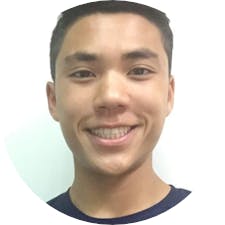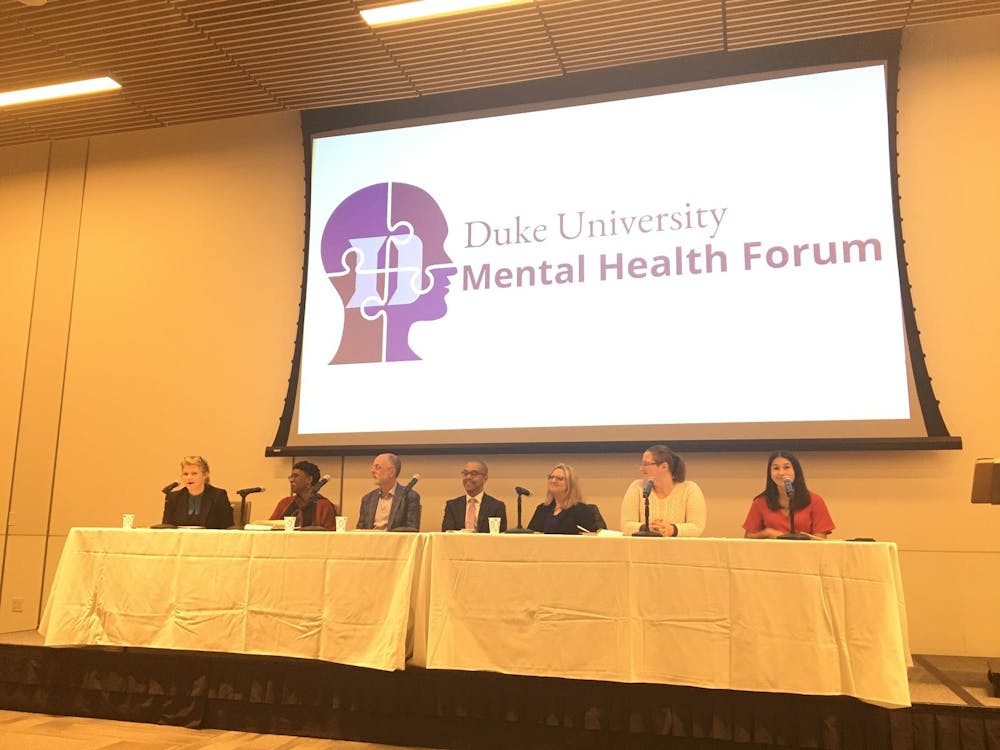Sleep, social life or school: Pick two.
Trying to balance academics, extracurriculars and busy social lives, Duke students often neglect their mental health. On Monday night, leaders from Duke Student Government and administration sought to address how to change that.
During this inaugural Mental Health Forum, moderators Liv McKinney, DSG president and a senior, and Alyssa Florwick, Graduate and Professional Student Council president and a Ph.D. student in biochemistry, asked pre-submitted student questions to the panelists.
Uncovering the 'black box'
Much of the discussion consisted of demystifying the “black box,” or rumors students mistakenly believe about mental health resources. In particular, the panel debunked the claim that Counseling and Psychological Services allows students to arrange only six meetings in total.
“I want to shout over and on the rooftops that a six-session cap on CAPS services is a myth,” Associate Director of CAPS Anita-Yvonne Bryant said.
Although students typically arrange about six sessions, all may participate in unlimited group therapy sessions from their first-year fall to senior spring, Bryant said. She also responded to a common perception that CAPS services require a lengthy wait time, explaining that the span between requesting and receiving an appointment lasts approximately one week.
Another myth involves the issue of equity, as students voiced concern that Duke provides financial grants for off-campus resources only in severe cases.
This is simply not the case, according to Director of DukeReach Amy Powell. Duke offers funding across a wide spectrum of cases, she said, and attempts to refer students to resources within walking distance when possible. Powell noted that she is in the process of setting up discounted Lyft rides as another alternative.
Panelists celebrated recent achievements regarding mental health resources, such as the decreased stigma on campus in getting help and increased engagement across all demographics. At the same time, they recognized the wide margin for improvement. The panel highlighted multiple initiatives to increase access and awareness, such as promoting opportunities for graduate students, integrating their work with Housing and Residential Life’s programming and providing mental health “first-aid” training.
Promoting ‘authentic excellence’
The panelists addressed issues with a campus culture that underlie mental health concerns, beginning with this question from McKinney: “What will Duke do to prevent the mental health problems that it causes in the first place?”
Projections of relentless productivity and effortless perfection can often feel “merciless” and accentuate the feelings of loneliness that undermine mental health, said Mary Pat McMahon, vice provost/vice president for student affairs. She and Gary Bennett, vice provost for undergraduate education, both acknowledged that this phenomenon occurs at other elite universities.
Bennett pointed to the selectivity of student groups as a contributing factor to this epidemic, and he plans to work with DSG to address this issue. Whether from pre-orientation programs, FOCUS programs or selective living groups, a “constant flood of rejection” exists on campus.
“That's not the way that any of us want you to experience your entrance into this place and into this community,” Bennett added.
This selectivity usually reflects a constrained budget rather than the actual merit of applicants, Bennett said. Yet, “we all get caught up in this silliness of applying for everything,” he said, only to feel unduly dejected when an application is denied.
“Somewhere along the way, there was this equation of selectiveness equals value,” McMahon said.
The panelists asserted their desire for students to scrap any image of an “ideal Duke student”—someone who comfortably juggles rigorous academics and numerous extracurriculars with a robust social life. Instead, they want to foster a culture in which students can embrace each other as holistic human beings.
Students “need time to reflect, build resilience, talk to other people and screw up,” McMahon said, emphasizing that administrators are working to ensure improvement.
One major step involves prioritizing sleep and other forms of rest by knowing when to turn down an opportunity.
“We just don’t teach anybody when it’s good to say no,” Director of DuWell Tom Szigethy said.
Equally important is the need to move from competition to community, Szigethy said. “In competition, only one person wins,” he added. Instead, he said we need to exemplify compassion for both self and for others, an expectation of excellence within the context of community.
These kinds of adjustments require students to recognize their core values as a form of “authentic excellence,” Bryant said, referring to the title of a book.
Bennett, who is also the Bishop-MacDermott family professor of psychology and neuroscience, suggested that therapy bridges the gap between one’s current situation and their ultimate values. For Bennett, his core value is caring for his daughters, and he experiences anxiety when he strays from that value by overworking. In the same way, students should examine their overarching purpose in life and structure their lives accordingly.
“What's really central in that process is identifying who you are and what you care about,” he said. “What's the impact you want to have in the world?”
During his trips to shareholder events, alumni will come up to Bennett and share the challenges they face in their day-to-day lives, as well as their frequent regrets over their chosen paths. These people urge him to help students to clarify their purpose early, he said, before their adolescence shifts into middle age in the blink of an eye.
“I hear this all the time,” Bennett said. “And it scares me.”
'There are changes to be made'
First-year Zella Hanson said that the concept for a mental health panel originated while working with McMahon to provide Lyft codes for students seeking off-campus mental health resources. She deemed this forum as the first step to “convincing administrators that there are changes to be made.”
Sophomore and organizer Shrey Majmudar—a DSG senator of academic affairs— said the night demonstrated the cooperative spirit between McMahon and Bennett, who see the correlation between academic success and student life components.
“If someone's not performing at their best in one, they're not going to perform well in the other,” he said. “[Academics and student life] are married together.”
For sophomore Sonia He, the forum reminded her of the importance of relationships in any community.
“We’re all striving for happiness, but happiness comes from our connections to others,” she said.
Senior Rebekah Lester emphasized the importance of dispelling rumors about mental health. Ultimately, this task falls to students, she said.
“We’re supposed to be taking [these lessons] as students to other students,” she said, “because student-run advocacy is going to be the best form of change on campus.”
Get The Chronicle straight to your inbox
Signup for our weekly newsletter. Cancel at any time.

Chris Kuo is a Trinity senior and a staff reporter for The Chronicle's 118th volume. He was previously enterprise editor for Volume 117.

